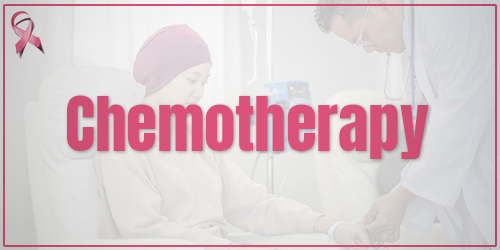Chemotherapy uses potent drugs to kill fast-growing cells, often used for treating cancer due to its effectiveness against rapidly multiplying cancer cells. Various chemotherapy drugs, used alone or combined, target different types of cancers. While effective, chemotherapy can also lead to mild to severe side effects.
Why is Chemotherapy Done?
Chemotherapy serves several purposes in the treatment of cancer, depending on the specific situation and goals of the patient's care:
- Primary Treatment for Cancer:
Chemotherapy may be used as the primary or sole treatment for cancer, aiming to cure the disease by targeting and killing cancer cells throughout the body.
- Adjuvant Therapy:
After initial treatments like surgery or radiation therapy, chemotherapy can be used to eliminate any remaining cancer cells that may not be visible or have spread to other parts of the body. This helps reduce the risk of cancer recurrence.
- Neoadjuvant Therapy:
In some cases, chemotherapy is administered before surgery or radiation therapy. This approach aims to shrink the tumor and make it easier to remove or target with other treatments, improving the likelihood of successful outcomes.
- Palliative Care:
Chemotherapy is also used in palliative care to alleviate symptoms and improve the quality of life for patients with advanced or metastatic cancer. By reducing the size of tumors or slowing their growth, chemotherapy can help manage pain, improve organ function, and enhance overall well-being.
- Combination Therapies:
Chemotherapy is often used in combination with other cancer treatments, such as targeted therapy, immunotherapy, or hormone therapy. These combined approaches can enhance treatment effectiveness and provide comprehensive care for patients.
- Types of Cancer:
Chemotherapy is utilized across various types of cancer, including solid tumors (like breast, lung, and colorectal cancer) and hematologic malignancies (such as leukemia and lymphoma). The specific chemotherapy drugs and regimen depend on the type and stage of cancer, as well as individual patient factors.
Overall, chemotherapy plays a crucial role in cancer treatment by targeting cancer cells and helping achieve different treatment goals, whether that involves cure, symptom relief, or preparation for other therapies. It is an integral part of multidisciplinary cancer care aimed at improving outcomes and enhancing the quality of life for patients.
What are the side effects of chemotherapy?
Chemotherapy, while effective in treating cancer, can also cause a range of side effects due to its impact on fast-growing cells in the body. The specific side effects experienced can vary widely depending on the type of chemotherapy drugs used, the dosage, and individual patient factors. Here are some common side effects of chemotherapy:
- Nausea and Vomiting: One of the most common side effects, chemotherapy can trigger nausea and vomiting. Anti-nausea medications may be prescribed to help manage these symptoms.
- Hair Loss: Chemotherapy drugs can affect hair follicles, leading to hair loss or thinning. This can include hair loss on the scalp, eyebrows, eyelashes, and body hair.
- Fatigue: Many patients undergoing chemotherapy experience fatigue or tiredness, which can range from mild to severe. Getting adequate rest and managing energy levels are important during treatment.
- Decreased Blood Cell Counts: Chemotherapy can lower the levels of red blood cells (anemia), white blood cells (neutropenia), and platelets (thrombocytopenia). This can increase the risk of infection, bleeding, and fatigue.
- Mouth Sores: Some chemotherapy drugs can cause mouth sores or mucositis, which can be painful and affect eating and speaking.
- Loss of Appetite: Chemotherapy may lead to changes in taste, loss of appetite, or difficulty eating, which can contribute to weight loss and nutritional deficiencies.
- Skin Changes: Skin may become dry, itchy, or more sensitive to sunlight during chemotherapy. Some patients may also experience rash, redness, or changes in nail texture.
- Neuropathy: Certain chemotherapy drugs can cause peripheral neuropathy, resulting in tingling, numbness, or pain in the hands and feet.
- Digestive Issues: Chemotherapy can lead to diarrhea, constipation, or changes in bowel habits. Stomach upset, bloating, or abdominal pain may also occur.
- Fertility Issues: Chemotherapy can affect fertility in both men and women, potentially causing temporary or permanent changes in reproductive function.
It's important to note that not all patients will experience all of these side effects, and the severity can vary. Healthcare providers work closely with patients to manage side effects and improve quality of life during chemotherapy treatment. Medications, lifestyle adjustments, and supportive care strategies are often used to help minimize side effects and optimize treatment outcomes.
Are these Side Effects Of Chemotherapy manageable?
Yes, many side effects of chemotherapy are manageable with proper medical care, lifestyle adjustments, and supportive strategies. While each person's experience with chemotherapy can vary, healthcare providers have several tools and interventions available to help minimize side effects and improve quality of life during treatment.
With proper medical care, support, and lifestyle adjustments, many side effects of chemotherapy can be effectively managed, allowing patients to cope better with treatment and improve their overall well-being. Open communication with healthcare providers and adherence to treatment recommendations are essential for successful side effect management.














